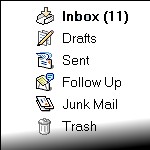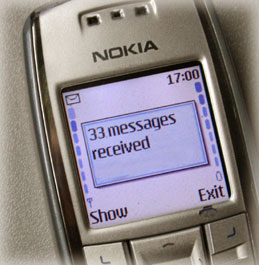Today we are going to talk about how important social media and email have become in our lives. Do they help us be more productive or do they dominate our daily lives? 2010 may have ended peacefully and the holiday season was pretty calm but what was your first look at the internet like when you came back to work? Hundreds of email messages that were waiting for an answer? Dozens of requests to join somebody’s Linked-In network or to accept or decline messages because you are the moderator of a list or a blog? To be honest, after 10 minutes at the computer where I felt like a fire-fighter trying to get the worst catastrophies under control I was tempted to shut down the computer and do some “real work”. But did I? No, somehow I felt I needed to write quick answers, press “Like” butt0ns on Facebook and accept digital invitations because it all looked so urgent and real even though I was alone in my office and all the urgency was “only digital”.
absolutely addicted
I met Elaine and Will and had a discussion about how to monitor your work-life balance and perhaps separate your business and your private lives. In this respect almost all my friends fall into one of two very separate cultures and will explain to you that their particular work situation (rather than their own choice) determines their behavior. Are you the kind of a person who will switch off totally after work and recharge your batteries so that you can perform well in the work place afterwards? Or are you always connected and keep checking your email account at home even when you should be preparing dinner? If you decide not to look at your work email at home, does that this really mean that you are less than fully committed to your job or does the constant digital connection to your work place show that you cannot let go and eventually lead to burn-out syndrome? However we deal with this, most of us somehow have a bad conscience about our work-life balance one way or another, so let us discuss this and see whether digital addiction is actually a bad thing? In our first category Elaine and Will describe how two partners deal with this daily challenge in very different ways.
absolutely professional
In our second category Andreas Faulstich tells our interviewer Maria that some badly written email messages can drive him crazy and cause him a lot of extra work. Fortunately, there are only few messages which steal his time. Listen to how he tries to deal with these messages and how he suggests writing email messages more professionally. First, Maria asked Andreas how many email messages he receives every day?
absolutely connected
In our last category we organized a round table where I am talking with Lucy, Emese and Markus about how students who leave their home universities and study abroad can stay connected with family, friends and their home university through the digital media. Do we perhaps need to choose different channels for different target groups?
Our next show will be coming to you from Anne Fox in Denmark on 04. February
Until then –
Bleiben Sie absolut interkulturell!
The host of this show is: Dr. Laurent Borgmann
Editor: Dino Nogarole


